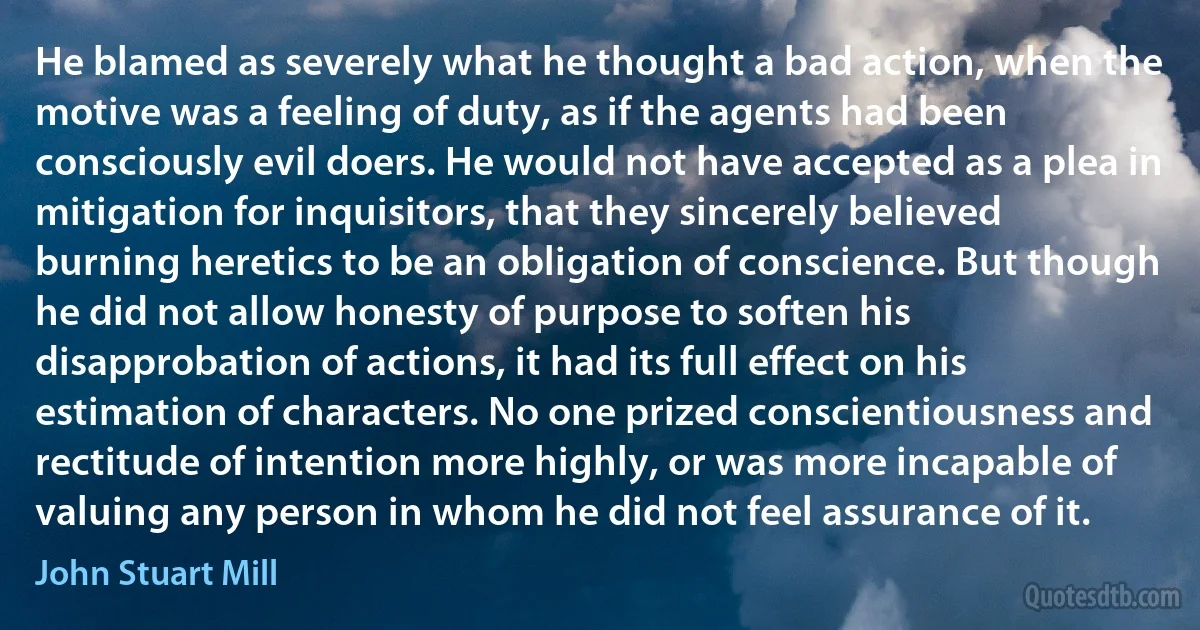
He blamed as severely what he thought a bad action, when the motive was a feeling of duty, as if the agents had been consciously evil doers. He would not have accepted as a plea in mitigation for inquisitors, that they sincerely believed burning heretics to be an obligation of conscience. But though he did not allow honesty of purpose to soften his disapprobation of actions, it had its full effect on his estimation of characters. No one prized conscientiousness and rectitude of intention more highly, or was more incapable of valuing any person in whom he did not feel assurance of it.
John Stuart MillRelated topics
action bad burning conscience conscientiousness disapprobation duty evil full honesty mitigation person purpose rectitude thoughtRelated quotes
I now began for the first time to envy those young cubs at the university who had fine scholars to tell them what was what; professors who had devoted their lives to mastering and focusing ideas in every branch of learning; who were eager to distribute the treasures they had gathered before they were overtaken by the night. But now I pity undergraduates, when I see what frivolous lives many of them lead in the midst of precious fleeting opportunity. After all, a man's Life must be nailed to a cross either of Thought or Action. Without work there is no play.

Winston Churchill
You cannot do anything without rousing the masses to action. A plenary meeting of the Soviet must be called to decide on mass searches in Petrograd and the goods stations. To carry out these searches, each factory and company must form contingents, not on a voluntary basis: it must be the duty of everyone to take part in these searches under the threat of being deprived of his bread card. We can't expect to get anywhere unless we resort to terrorism: speculators must be shot on the spot. Moreover, bandits must be dealt with just as resolutely: they must be shot on the spot.

Vladimir Lenin
Over the years, I have become convinced that Hellenism as a culture represents not a static condition of uniform sublimity mysteriously achieved and maintained as an effect of some racial advantage. Rather it should be understood as an evolving process, governed by a dynamic of change, as both language and thought underwent transformational alteration caused by a transition from orality to literacy. The instrument of change is discerned to be the invention of the Greek alphabet, at a quite late stage in the history of developing cultures.

Eric A. Havelock
If someone is frequently under attack by negative entities, it is because of a polluted consciousness that needs to be upgraded. A negative entity dislikes visiting a clean mind as much as a rat dislikes going to a clean place. [...] Putting up spiritual paraphernalia around the home and not allowing any negative activity to go on in the environment can help you greatly. This may mean asking friends and loved ones to refrain from drinking, smoking, taking drugs, gossiping, or doing any activity that does not encourage spiritual thought and action.

Bhakti Tirtha Swami
The ordinary person senses the greatness of the odds against him even without thought or analysis, and he adapts his attitudes unconsciously. A huge passivity has settled on industrial society. For people carried about in mechanical vehicles, earning their living by waiting on machines, listening much of the waking day to canned music, watching packaged movie entertainment and capsulated news, for such people it would require an exceptional degree of awareness and an especial heroism of effort to be anything but supine consumers of processed goods.

Marshall McLuhan
